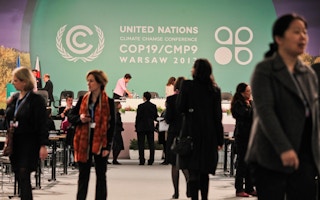Governments want to launch a platform at United Nations climate talks to help set common standards and accounting rules and tie together national and regional emissions trading schemes, but developing countries and green groups warned that talk of a global carbon market is premature.
Almost 200 nations are in Poland for a November 11-22 meeting to plan a 2015 U.N. deal in Paris that would start to tackle climate change in 2021.
Most developed countries see carbon markets as crucial under any new agreement because they seek out the cheapest emissions reductions, making climate change targets more achievable.
More than 40 mainly developed countries, including New Zealand and members of the European Union, have, or are in the process of developing, markets to help cut their output of climate-warming emissions by putting a price on carbon dioxide.
As those schemes are disconnected from each other, governments have proposed launching a framework to unite them under a single voluntary platform to share ideas, with a view to eventually launching a global market to battle climate change.
“Markets are vital … and it’s not premature (to be discussing them). It’s more than timely to be thinking now, in advance of 2015, about how to manage their intersection,” said New Zealand’s climate change ambassador Jo Tyndall, adding there was a clear link between carbon markets and channeling climate finance to poor countries.
Tyndall said the platform, a concept floated by Poland earlier this year, would be a “toolbox” that provides a variety of tools to help develop technical standards and best practice approaches to build trading rules that could underpin a global market.
It would also codify transparency and accounting standards that are “fundamental to ensure all mitigation tools and options, including carbon markets, have environmental integrity and will avoid double-counting (emissions cuts),” she added.
“We have a whole series of different mechanisms all over the world … (so) should we wait until Paris to start thinking what would be useful to have in 2021, or should we look at what we are doing already?”, said Poland’s Tomasz Chruszczow, chair of one U.N.’s negotiating streams.
More pressing issues
But poor nations argue that more pressing issues need to be ironed out, for example the overarching dispute between rich and poor countries over how to share efforts to cut emissions, before more market-based mechanisms are developed or the groundwork for a global trading scheme is laid.
“A market is important but it’s premature to deliver it now … with so many other issues that have to be resolved before 2015,” said Khalid Abuleif, an advisor to Saudi Arabia’s ministry of petroleum and mineral resources and the country’s lead negotiator at the U.N. talks.
“Let’s not bring markets in to influence that process.”
Emerging economies like Saudi Arabia and China, the world’s top emitter, want rich countries to commit to doing more to cut greenhouse gas output while allowing poorer nations to burn more fossil fuels to build their economies and end poverty.
“We need to know the nature of those commitments before we can design a credible market. We cannot afford to have failure,” Abuleif said, citing existing U.N.-backed carbon trading mechanisms such as the Clean Development Mechanism (CDM).
The CDM has since 2005 helped channel more than $315 billion to poor nations to help them cut their CO2 emissions or adapt to the effects of climate change.
But the failure of nations to craft a new global pact has caused demand for the CO2 offsets generated under the U.N.’s carbon markets to dry up, sending prices crashing and nearly bankrupting many of the companies that invested in the schemes.
”(The toolbox) is not about establishing yet another mechanism to produce units that no one will buy, it’s about understanding what we are doing collectively, which is very helpful in understanding how a new global agreement might work,” Poland’s Chruszczow said.
Green groups including the Third World Network have called the idea a “recipe for disaster”, saying governments are pushing forward with building new markets before studying and learning from the failings of existing ones.








